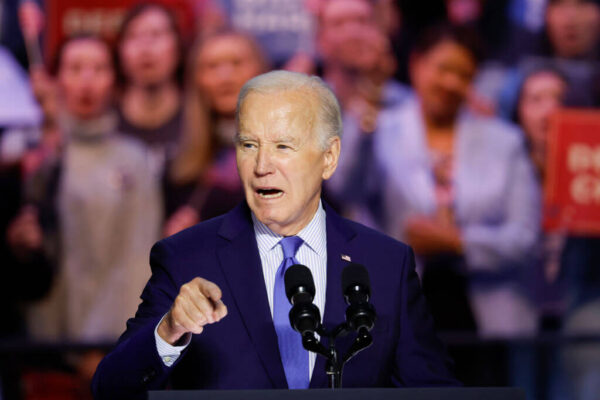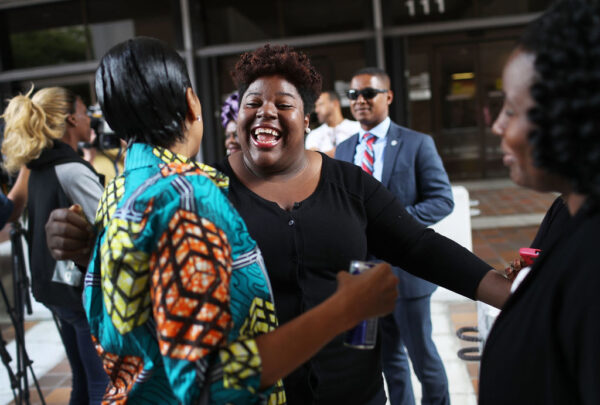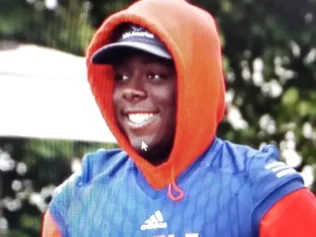The 2024 presidential election is nearly upon us, and just weeks into the year, Donald Trump continues to gain momentum in voter favorability, which contributed greatly to his performances in the Iowa caucuses and New Hampshire Republican primary, while President Joe Biden’s ratings have dropped in his key support groups, especially among the nation’s Black voters.
Biden’s 2020 campaign promises to tackle reform in several areas that would elevate Black businesses and communities, his advocacy of equity, and his star-backing from his predecessor Barack Obama earned him the faith of voters who were fatigued from four years of Donald Trump and believed that Biden could reverse, or at least mitigate, the MAGA-incited ideologies that swept the nation.

Polls show that Biden began his presidency with an 86 percent approval rating among Black Americans, which was reportedly higher than any other racial group. Now, as the nation heads into a fresh election year, that percentage hovers just above 60 percent now.
In his time as president, Biden has overseen the withdrawal of troops from Afghanistan, the COVID-19 pandemic, the rollback of abortion rights, a tipping point in the Black Lives Matter Movement that featured heavy calls for police reform following George Floyd’s death, calls for gun reform in the wake of several mass shootings, dissension on voting rights and student loan forgiveness, and international crises like the Russia-Ukraine and Israel-Hamas wars.
According to one survey from last August, the issues that Black Americans prioritized most in the last year are the state of the U.S. economy, racial discrimination, and healthcare – areas that have drastically affected Black communities in recent years. While many Black voters approve of the administration’s work to reduce the Black unemployment rate to record-low levels and lower the cost of prescription drugs, some still feel Biden has fallen short of furthering much of the Black agenda.
A GenForward survey released last month shows that 1 in 5 Black Americans plan to vote for Trump, which amounts to 17 percent. Another 20 percent of Black voters say they would vote for “someone else” other than Biden or Trump.
Corryn Freeman, a lifelong Democratic voter and the head of the Future Coalition, which works directly with young voters and changemakers, is part of the pool of voters who are considering voting for third-party candidates. For her, the administration’s failure to pass sweeping student debt reform and create new measures for corporate tax accountability, as well as the U.S. government’s backing of Israel in its genocide against the Palestinian people is enough to break away from Biden as he seeks a second term.
“I will not vote for Joe Biden. Unless he calls for a ceasefire right now, stops sending money right now, maybe I’ll vote for him,” the 34-year-old told Atlanta Black Star. “For me, the level of disappointment in this president is so much so that you can’t get my vote. I’m open to electing a third-party candidate because the two-party system for me does not feel like it works.”
The sectors of Black America that have previously sided with Democrats at the polls aren’t just losing faith in Biden. They’re starting to cast a berth between themselves and the party he represents.
Polls conducted by the New York Times and Siena College last November reveal that 22 percent of Black voters in six of the most important battleground states – Nevada, Georgia, Arizona, Michigan, Pennsylvania, and Wisconsin – said they would support Trump in 2024. While Biden still carries a major advantage among this voting group, the increase in support for Trump is still troubling.
No Republican presidential candidate or president has ever won more than 12 percent of the Black vote in close to 50 years, according to the Times. Trump won 8 percent of Black America’s vote in 2020, but his growing popularity among Black voters could be a threat to Biden on Election Day.
Valencia Gunder, a Floridian who heads up The Smile Trust, an organization that provides food, housing security, and disaster relief to underresourced communities, told the Atlanta Black Star that the blame shouldn’t solely be directed toward Biden, but in her eyes, there’s a larger issue at hand that’s impacting the trust some Black Americans have in the Democratic Party.

“I think the issue is not just Joe Biden. I think the issue is also the Democratic Party. I feel as if, for a long time, we are put into this position where we just need to make a strategic vote to stop the lesser of the evils,” Gunder said of Black voters. “I feel like that was the situation when Joe Biden won in 2020, but we haven’t seen anything that has shifted the material conditions of our people.”
“I don’t think that, beyond physical representation, we have seen meaningful reform that impacts Black people systemically,” Freeman remarked. “We’re not seeing it through voting in the Democratic party. We’re starting to see Black people turn to more self-determined approaches outside of the political system to show up for ourselves because we lack confidence in it.”
Biden has gone to lengthy efforts to pass sweeping federal measures that his voter base is calling for. However, his attempts to pass legislation aimed at forgiving trillions in student loan debt, enacting meaningful police reform, addressing voting rights issues, and combating the climate crisis have proved challenging to get through Congress.
Congressional Republicans, who currently make up the majority of the House, have been unwilling to pass several pieces of legislation addressing these issues that have crossed their chamber. Throughout his presidency, Biden has also worked to reduce inflation, passed modest gun control measures, and sought to bring student loan debt relief to millions, but advocates still want more aggressive action.
As Biden works hard now to court voters, something taking precedence for his re-election campaign is reaching young, Black voters who aren’t pleased with his performance on voting rights, police reform, and marijuana decriminalization, but also feel disconnected from his administration.
”First and foremost, young people want to be heard. And it seems like young people are very seldom invited into the room, acknowledged, and even heard,” Freeman said of young voters she works with who desperately want gun and education reform.
Some analyses align with Freeman’s insights, revealing that young voters don’t feel elected officials address them or prioritize their concerns.
So now, to strengthen relations with this core group, the Biden administration has launched a digital and in-person outreach campaign in Wisconsin and Arizona that will make concerted efforts to state his case for re-election. If all goes well, he’ll expand the program to seven other battleground states.
This specific outreach Biden is doing in key states to re-energize the confidence that’s waned in his Black voter base reflects a fuller strategy at work.
He’s spent the last few months mobilizing party members, including Vice President Kamala Harris, to visit Black neighborhoods and Black-led organizations, as well as historically Black colleges and universities to showcase his first-term achievements and engage with community leaders. In doing so, he hopes to test his messaging against a backdrop of dissatisfied voters to stoke faith that he’ll continue working on Black America’s behalf in a hopeful second term.
He recently invited Black male leaders to the White House to assess how he can improve his standing among the nation’s Black voters, particularly among Black men. He’s also released ad campaigns demonstrating how the administration has specifically helped Black farmers and promoted racial equity, and he’s partnered with social media influencers to target young, voting-age users to amplify his central campaign points.


